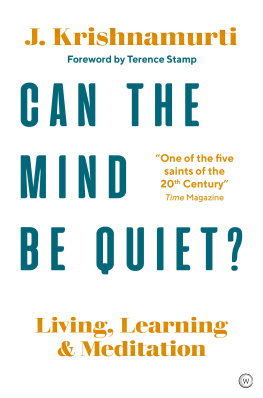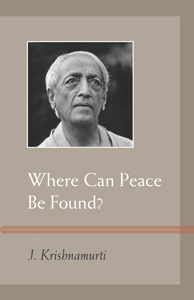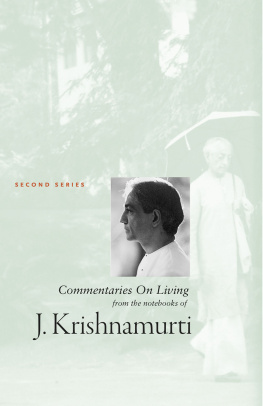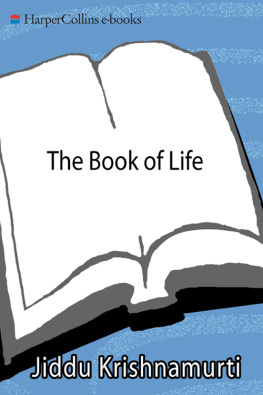Krishnamurti - On Living and Dying
Here you can read online Krishnamurti - On Living and Dying full text of the book (entire story) in english for free. Download pdf and epub, get meaning, cover and reviews about this ebook. publisher: Krishnamurti Foundation India, genre: Religion. Description of the work, (preface) as well as reviews are available. Best literature library LitArk.com created for fans of good reading and offers a wide selection of genres:
Romance novel
Science fiction
Adventure
Detective
Science
History
Home and family
Prose
Art
Politics
Computer
Non-fiction
Religion
Business
Children
Humor
Choose a favorite category and find really read worthwhile books. Enjoy immersion in the world of imagination, feel the emotions of the characters or learn something new for yourself, make an fascinating discovery.

- Book:On Living and Dying
- Author:
- Publisher:Krishnamurti Foundation India
- Genre:
- Rating:4 / 5
- Favourites:Add to favourites
- Your mark:
- 80
- 1
- 2
- 3
- 4
- 5
On Living and Dying: summary, description and annotation
We offer to read an annotation, description, summary or preface (depends on what the author of the book "On Living and Dying" wrote himself). If you haven't found the necessary information about the book — write in the comments, we will try to find it.
On Living and Dying — read online for free the complete book (whole text) full work
Below is the text of the book, divided by pages. System saving the place of the last page read, allows you to conveniently read the book "On Living and Dying" online for free, without having to search again every time where you left off. Put a bookmark, and you can go to the page where you finished reading at any time.
Font size:
Interval:
Bookmark:
On Living and Dying
Copyright 1992 Krishnamurti Foundation Trust Ltd and Krishnamurti Foundation of America
On Living and Dying
J. Krishnamurti
Krishnamurti Foundation India
Death must be something extraordinary, as life is. Life is a total thing. Sorrow, pain, anguish, joy, absurd ideas, possession, envy, love, the aching misery of lonelinessall that is life. And to understand death, we must understand the whole of life, not take just one fragment of it and live with that fragment, as most of us do. In the very understanding of life there is the understanding of death, because the two are not separate.
London
12 June 1962
Contents
Foreword
J IDDU K RISHNAMURTI was born in India in 1895 and, at the age of thirteen, taken up by the Theosophical Society, which considered him to be the vehicle for the world teacher whose advent it had been proclaiming. Krishnamurti was soon to emerge as a powerful, uncompromising, and unclassifiable teacher, whose talks and writings were not linked to any specific religion and were neither of the East nor the West but for the whole world. Firmly repudiating the messianic image, in 1929 he dramatically dissolved the large and monied organization that had been built around him and declared truth to be a pathless land, which could not be approached by any formalized religion, philosophy, or sect.
For the rest of his life Krishnamurti insistently rejected the guru status that others tried to foist upon him. He continued to attract large audiences throughout the world but claimed no authority, wanted no disciples, and spoke always as one individual to another. At the core of his teaching was the realization that fundamental changes in society can be brought about only by a transformation of individual consciousness. The need for self-knowledge and understanding of the restrictive, separative influences of religious and nationalistic conditionings was constantly stressed. Krishnamurti pointed always to the urgent need for openness, for that vast space in the brain in which there is unimaginable energy. This seems to have been the wellspring of his own creativity and the key to his catalytic impact on such a wide variety of people.
Krishnamurti continued to speak all over the world until he died in 1986 at the age of ninety. His talks and dialogues, journals and letters have been collected into more than sixty books. From that vast body of teachings this series of theme books has been compiled. Each book focuses on an issue that has particular relevance to and urgency in our daily lives.
Saanen, 28 July 1964
I would like to talk about something that includes the totality of life, something that is not fragmentary but a total approach to the whole existence of man. To go into it rather deeply, it seems to me that one must cease to be caught in theories, beliefs, dogmas. Most of us plough incessantly the soil of the mind, but we never seem to sow. We analyse, discuss, tear things to pieces, but we do not understand the whole movement of life.
Now I think there are three things that we have to understand very deeply if we are to comprehend the whole movement of life. They are time, sorrow, and death. To understand time, to comprehend the full significance of sorrow, and to abide with deathall this demands the clarity of love. Love is not a theory, nor is it an ideal. Either you love, or you do not love. It cannot be taught. You cannot take lessons in how to love, nor is there a method by the daily practice of which you can come to know what love is. But I think one comes to love naturally, easily, spontaneously, when one really understands the meaning of time, the extraordinary depth of sorrow, and the purity that comes with death. So perhaps we can considerfactually, not theoretically or abstractlythe nature of time, the quality or structure of sorrow, and the extraordinary thing that we call death. These three things are not separate. If we understand time, we shall understand what death is, and we shall understand also what is sorrow. But if we regard time as something apart from sorrow and death, and try to deal with it separately, then our approach will be fragmentary, and therefore we shall never comprehend the extraordinary beauty and vitality of love.
We are going to deal with time, not as an abstraction but as an actualitytime being duration, the continuity of existence. There is chronological time, hours and days extending into millions of years; and it is chronological time that has produced the mind with which we function. The mind is a result of time as the continuity of existence, and the perfecting or polishing of the mind through that continuity is called progress. Time is also the psychological duration that thought has created as a means of achievement. We use time to progress, to achieve, to become, to bring about a certain result. For most of us, time is a stepping stone to something far greaterto the development of certain faculties, to the perfecting of a particular technique, to the achievement of an end, a goal, whether praiseworthy or not; so we have come to think that time is necessary to realize what is true, what is God, what is beyond all the travail of man.
Most of us regard time as the period of duration between the present moment and some moment in the future, and we use that time to cultivate character, to get rid of a certain habit, to develop a muscle or an outlook. For two thousand years the Christian mind has been conditioned to believe in a Saviour, in hell, in heaven; and in the East a similar conditioning of the mind has been produced over a far longer period. We think that time is necessary for everything that we have to do or understand. Therefore time becomes a burden; it becomes a barrier to actual perception; it prevents us from seeing the truth of something immediately because we think that we must take time over it. We say, Tomorrow, or in a couple of years, I shall comprehend this thing with extraordinary clarity. The moment we admit time we are cultivating indolence, that peculiar laziness that prevents us from seeing immediately the thing as it actually is.
We think we need time to break through the conditioning that societywith its organized religions, its codes of morality, its dogmas, its arrogance, and its competitive spirithas imposed upon the mind. We think in terms of time because thought is of time. Thought is the response of memorymemory being the background that has been accumulated, inherited, acquired by the race, by the community, by the group, by the family, and by the individual. This background is the outcome of the additive process of the mind, and its accumulation has taken time. For most of us the mind is memory, and whenever there is a challenge, a demand, it is memory that responds. It is like the response of the electronic brain, which functions through association. Thought being the response of memory, it is in its very nature the product of time and the creator of time.
Please, what I am saying is not a theory; it is not something that you have to think about. You dont have to think about it but rather have to see it, because it is so. I am not going into all the intricate details, but I have indicated the essential facts, and either you see them, or you dont see them. If you are following what is being said, not just verbally, linguistically, or analytically, but if you actually see it is so, you will realize how time deceives. And then the question is whether time can stop. If we are able to see the whole process of our own activitysee its depth, its shallowness, its beauty, its uglinessnot tomorrow, but immediately, then that very perception is the action that destroys time.
Without understanding time, we cannot understand sorrow. They are not two different things as we try to make out. Going to the office, being with ones family, having childrenthese are not separate, isolated incidents. On the contrary, they are all profoundly and intimately related to each other, and we cannot see this extraordinary intimacy of relationship if there is not the sensitivity that love brings.
Next pageFont size:
Interval:
Bookmark:
Similar books «On Living and Dying»
Look at similar books to On Living and Dying. We have selected literature similar in name and meaning in the hope of providing readers with more options to find new, interesting, not yet read works.
Discussion, reviews of the book On Living and Dying and just readers' own opinions. Leave your comments, write what you think about the work, its meaning or the main characters. Specify what exactly you liked and what you didn't like, and why you think so.











